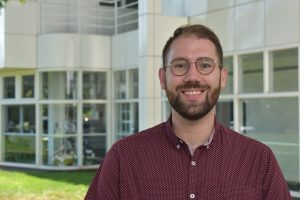The six remarkable students in our 2019-20 class of International Peacemaking Program fellows will spend a year at Hartford Seminary studying mediation, interfaith dialogue and public speaking while earning a Graduate Certificate. They come from different religions, backgrounds, and parts of the world, but they are all interested in fostering peace.
Q. If you had to choose one word to describe yourself, what would it be? And how will you use this trait in the IPP at Hartford Seminary?
A. Facilitator. In so many ways, my desire is to make it easier for people to love themselves and others. That process can be deeply uncomfortable because it often requires us to disrupt current, dysfunctional patterns, and challenge the status quo. In the end, growth and a loving community can be found on the other side of discomfort. I find joy in helping others, and myself, to navigate the risky territory found in the unfamiliar and unknown.
Q. Why did you choose to apply for Hartford Seminary’s IPP?
A. Most of my adult life has been a continuous cycle of deconstructing, unlearning, and relearning what I think I know about myself, about others, and about the world. It has been a great joy to do so with the support and challenge of a diverse community. Hartford Seminary’s IPP offers an international and multifaith community, which is helping me to identify my own gaps, misunderstandings, and opportunities for growth. I feel deeply connected to my understandings of truth and beauty, many of which have their roots in Christianity. I value opportunities to share that with others, while creating space to gracefully sit in the tension of our differences.
Q. Who inspires you the most? And how will you reflect this person during your time in the IPP?
A. Honestly, I am most inspired by young people like the Youth Equity Squad, in Manchester Public Schools. As a Racial Equity Consultant, I have the opportunity to serve as an ‘Adult in Solidarity’ to this youth-led initiative that is working towards identifying and addressing injustice within their school community. These young people innately understand that the need for a community of care, a sense of belonging, and envisioning around a shared goal are prerequisites to effective social transformation. As adults, we often want to bypass relationship development and disregard the emotional implications because we are so focused on actions, strategies, data, and outcomes. Young people remind us that self and community love are at the heart of social change.
Q. Where are you from and where did you go to school before Hartford Seminary? Is there an important memory/event in your childhood that led to your interest in peacemaking?
A. Hartford is my home and has been for nearly 15 years; I grew up in a small town in northwestern CT. My undergraduate study took place over the course of seven years at a variety of schools including Gordon College and UCONN. Ultimately my BA in Biblical Studies and Urban Ministry is from the Moody Bible Institute. I also studied at Eastern University, pursuing a MA program in Urban Studies with a concentration in Community Development.
Q. When you have free time, how do you spend it?
A. I love to spend time outside and enjoy activities like hiking, kayaking, picnics, reading in the park, and relaxing in a hammock. My fiancé and I watch a lot of home renovation shows and practice our skills with various home improvement projects. I also enjoy traveling, exploring new places and cuisines, deep conversations, board games, and playing with my Boston Terrier, Monster.
Q. Where do you see yourself going after your year at Hartford Seminary?
A. I hope to stay in Hartford to help foster interreligious dialogue between people who hold diverse political and social positions within the Christian faith. I am specifically interested in the relationship between faith, sexuality, and race. An abuse of the Christian Bible, by many who claim to follow Jesus, has played a unique and horrifying role in establishing and maintaining oppressive systems like patriarchy, colonization, slavery, nationalism, white supremacy, homophobia, and religious intolerance. I believe the Christian church has a unique role to play in the liberation of all people, working with people of all faith, and non-faith traditions to usher in a new kingdom that centers on justice, mercy, humility, and love. I’m not yet sure what my role will be, but I hope to use my skills as a peacemaker to help people find healing and liberation.

 Sign-up now ›
Sign-up now ›